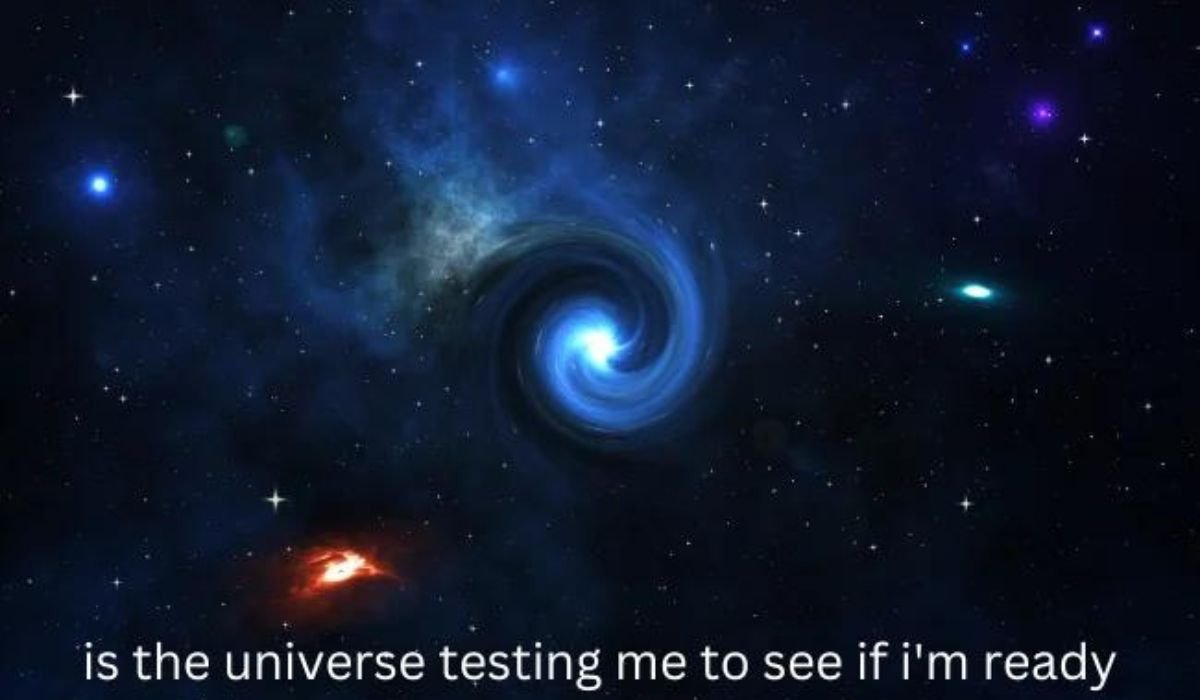Introduction to Is the Universe Testing Me to See If I’m Ready
The idea that the universe is testing us can be a comforting thought for some and a troubling one for others. It provides a framework to make sense of difficulties and setbacks by suggesting that they have a higher purpose. However, this belief can also lead to confusion and unnecessary self-doubt. By examining this concept closely, we can better understand how to approach challenges and find personal growth without attributing them to cosmic tests.
The Common Belief That Challenges Are Tests from the Universe
Personal Experience and the Confusion It Caused
Many people, when faced with difficult situations, wonder if they are being tested by a higher power or the universe. This belief often emerges during times of significant stress or hardship. For instance, if someone repeatedly faces financial difficulties or relationship problems, they might start questioning whether these struggles are tests to see if they are worthy or capable of overcoming them.
This perspective can lead to confusion and frustration. It might cause people to feel that their efforts are futile if they can’t seem to pass the test, or it may lead them to question their worth and purpose. Personal experiences with this belief can vary widely, but they often share a common theme of searching for meaning in adversity.
The Harmful Implications of This Belief
Believing that challenges are tests from the universe can have detrimental effects on mental health. It can foster a sense of inadequacy or failure if one feels they are not measuring up. This belief can also lead to:
- Increased Anxiety: The pressure to pass a supposed test can create unnecessary stress.
- Self-Doubt: Constantly questioning one’s worthiness or capabilities can undermine self-esteem.
- Feeling Powerless: Believing that challenges are predetermined tests may make people feel they lack control over their lives.
Understanding Challenges and Adversity
The Inevitability of Challenges in Life
Challenges are an inevitable part of life. Everyone encounters obstacles and difficulties at various points in their lives. These challenges arise due to various factors such as personal choices, circumstances, or natural events. Understanding that challenges are a normal aspect of life can help in accepting and dealing with them more effectively.
The Role of Adversity in Personal Growth
Adversity, while challenging, can be a powerful catalyst for personal growth. It often pushes individuals out of their comfort zones and encourages them to develop resilience, problem-solving skills, and emotional strength. Some of the benefits of facing adversity include:
- Enhanced Resilience: Overcoming obstacles builds mental and emotional toughness.
- Improved Problem-Solving Skills: Adversity often requires creative solutions and adaptability.
- Increased Empathy: Experiencing hardship can foster a deeper understanding and compassion for others.
Differentiating Between Challenges and Tests
It’s important to differentiate between challenges and tests. Challenges are obstacles that arise as part of the natural flow of life, while tests imply a deliberate evaluation of one’s worth or readiness. By viewing challenges as opportunities for growth rather than tests, individuals can approach them with a more constructive mindset.
Debunking the “Universe Testing” Myth
The Universe as an Indifferent Force
The universe, in scientific terms, operates without consciousness or intent. It is not an entity that plans or tests individuals. Instead, it is a complex system governed by natural laws. The notion that the universe is intentionally testing us is a belief based on personal interpretation rather than objective reality.
The Lack of Conscious Intent in Challenges
Challenges occur due to various factors like chance, personal choices, or environmental conditions. There is no evidence to suggest that these challenges are part of a conscious plan or test. Understanding that challenges are not tests can alleviate the pressure and help focus on practical solutions.
The Connection Between Challenges and Personal Choices
Challenges often arise from a combination of circumstances and personal choices. While external factors can influence situations, individual decisions play a significant role in how challenges are faced and managed. Taking responsibility for one’s choices can lead to more empowered and effective problem-solving.
The Psychology of Belief
The Power of Belief Systems
Beliefs play a powerful role in shaping our experiences. What we believe can influence how we perceive and react to challenges. The belief that the universe is testing us can affect our mindset, actions, and emotional responses. Understanding the power of belief systems can help in re-framing challenges and adopting a more positive perspective.
How Beliefs Can Shape Our Experiences
Beliefs can shape experiences by influencing our attitudes, behaviors, and expectations. For instance, if you believe that challenges are tests, you might approach them with anxiety or pressure. Conversely, viewing challenges as opportunities for growth can lead to a more proactive and positive approach.
The Role of Confirmation Bias in Reinforcing the “Testing” Myth
Confirmation bias is the tendency to search for, interpret, and remember information that confirms our pre-existing beliefs. If you believe that the universe is testing you, you might focus on events that seem to support this idea while ignoring evidence to the contrary. Recognizing this bias can help in challenging and adjusting your belief systems.
Alternative Perspectives on Challenges
Challenges as Opportunities for Growth
Instead of viewing challenges as tests, consider them as opportunities for growth. Challenges can help develop skills, build character, and offer new perspectives. Embracing this view can lead to a more constructive and resilient approach to overcoming difficulties.
The Concept of Karma and Past Actions
Some belief systems suggest that challenges are a result of past actions or karma. While this perspective can provide a framework for understanding difficulties, it is important to approach it with a balanced view. Karma can be seen as a way to reflect on personal actions and make positive changes rather than a form of punishment.
The Role of Free Will in Shaping Our Experiences
Free will allows individuals to make choices and shape their own destinies. While external factors and challenges are unavoidable, how one responds to them is influenced by personal decisions. Emphasizing free will empowers individuals to take control of their responses and actions.
Overcoming Challenges and Finding Purpose
Developing Resilience and Adaptability
Building resilience and adaptability are key to overcoming challenges. Strategies to enhance these qualities include:
- Developing a Growth Mindset: View challenges as opportunities for learning and development.
- Building Support Networks: Seek support from friends, family, or professional counselors.
- Practicing Self-Care: Prioritize physical and emotional well-being to better handle stress.
Finding Meaning and Purpose in Adversity
Finding meaning in adversity can provide motivation and a sense of purpose. Reflect on what you can learn from the experience and how it can contribute to personal growth. This perspective can help transform challenges into meaningful experiences.
Cultivating a Positive Mindset
A positive mindset can greatly influence how challenges are approached. Techniques to cultivate positivity include:
- Gratitude Practice: Focus on what you are thankful for.
- Positive Affirmations: Use affirmations to reinforce a positive outlook.
- Mindfulness: Practice mindfulness to stay present and reduce stress.
YOU MAY ALSO LIKE: Pirate Proxy: How It Works and What You Need to Know
Conclusion
The belief that “the universe is testing me to see if I’m ready” can offer a sense of purpose but also lead to unnecessary stress and self-doubt. By understanding challenges as natural and inevitable parts of life, and by viewing them as opportunities for growth rather than tests, individuals can approach adversity with resilience and a positive mindset. Embrace challenges as a chance to develop, learn, and grow, rather than a test of worthiness. Through this approach, you can navigate difficulties more effectively and find deeper meaning and purpose in your experiences.
FAQs
What does it mean when people say “the universe is testing me”? When people say “the universe is testing me,” they believe that their challenges are deliberate tests from a higher power to measure their worth or readiness. This idea suggests that difficulties have a deeper, cosmic purpose.
How can I stop feeling like I’m being tested by the universe? To shift away from feeling like you’re being tested, try viewing challenges as natural parts of life rather than cosmic trials. Focus on practical solutions, personal growth, and resilience to address and overcome difficulties.
Are challenges really tests from the universe? No, challenges are not tests from the universe. They are natural occurrences resulting from various factors, including personal choices and circumstances. Viewing them as opportunities for growth can be more beneficial.
How can understanding challenges as opportunities help me cope better? Recognizing challenges as opportunities for growth helps shift your perspective from feeling tested to actively engaging in problem-solving. This mindset can reduce stress, enhance resilience, and provide a more positive approach to overcoming obstacles.
What role does belief play in how we experience challenges? Beliefs significantly impact how we perceive and handle challenges. If you believe challenges are tests, you might experience more stress and self-doubt. Shifting beliefs to view challenges as growth opportunities can lead to a healthier and more constructive response.










